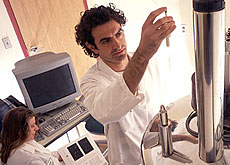Rebif sales drive record Serono profit

Europe’s largest biotech group, Serono, has posted record net profit of $390 million (SFr490 million) for 2003.
Net income was up 22 per cent on the previous year, boosted by sales of its multiple sclerosis drug, Rebif, and a weak dollar.
Turnover rose by almost a third, up to $2.02 billion.
“2003 has been a record year for Serono,” said the company’s chief executive, Ernesto Bertarelli.
Serono forecast 2004 earnings growth of between 15 per cent and 20 per cent, and it predicts revenue growth of around 12 per cent.
The Geneva-based company also reported net profit growth of 37 per cent for the fourth quarter of 2003.
Net income totalled $111.6 million (SFr140.8 million) in the fourth quarter, compared with $81.6 million the previous year.
Meanwhile, fourth-quarter revenue rose 29 per cent to $565.1 million.
Solid drug sales
One of the main reasons for the company’s strong growth was a big increase in worldwide sales of its flagship multiple sclerosis drug, Rebif, which rose 34 per cent in 2003 to $819.4 million.
Rebif accounts for nearly 45 per cent of Serono’s sales.
“These are reasonably solid results,” said Geoffrey Porges, an analyst at Sandford Bernstein. “Rebif could have been a little stronger, but it’s not a big miss.”
Sales of Rebif in the United States, where it faces tough competition from similar drugs by Biogen Idec and Schering, almost tripled last year. The drug entered the US market at the end of 2002.
Serono said Rebif now holds 24 per cent of the overall multiple sclerosis market, with a 14 per cent market share in the US. The company says it aims for Rebif to capture at least 30 per cent of the US market by 2006.
Bertarelli said he expects Raptiva – for treating the skin disorder, psoriasis – to generate annual sales of about $250-300 million when it is launched later this year.
Optimistic future
Bertarelli added that Serono plans to make a series of product acquisitions to broaden and deepen its pipeline of drugs in development.
He believes that the world’s biggest maker of fertility drugs and growth hormones can be an attractive partner for smaller biotechnology companies with interesting new products.
“The pharmaceutical market is still quite fragmented, so we would think that companies interested in reproductive health and multiple sclerosis would come to us,” he said.
Allan Shaw, the company’s chief financial officer, said continued growth would be driven mostly by higher drug sales and licensing revenue, but also by increased economies of scale.
The company’s share price rose 19 per cent in 2003. So far this year it has grown more than eight per cent.
In 2002, Serono reported total revenues of $1.55 billion, making it the world’s third-largest biotech company.
swissinfo with agencies
Serono has operations in 44 countries and employs more than 4,600 people.
The company employs over 1,300 research and development personnel and invests a quarter of its revenues into this area.
It has products in three main areas: reproductive health, neurology and growth and metabolism.
The company’s CEO, Ernesto Bertarelli, led Switzerland’s Alinghi yachting team to victory in last year’s America’s Cup

In compliance with the JTI standards
More: SWI swissinfo.ch certified by the Journalism Trust Initiative









You can find an overview of ongoing debates with our journalists here . Please join us!
If you want to start a conversation about a topic raised in this article or want to report factual errors, email us at english@swissinfo.ch.